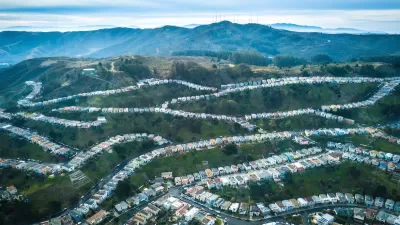Tomorrow morning, I'll don a long black robe, a funny-looking hat and an atrocious brown hood to cap off an adventuresome journey through planning school. Almost two years ago, I decided to leave a healthy career in journalism to enter a field that, by contrast, might still have careers a decade from now. It's been 21 months of angst, overwork, undersleep, and hours-long battles with American FactFinder. And it's been completely, totally worth it. Here are a few of the best lessons learned from two hard-fought years of planning education.
Tomorrow morning, I'll don a long black robe, a funny-looking hat and an atrocious brown hood to cap off an adventuresome journey through planning school. Almost two years ago, I decided to leave a healthy career in journalism to enter a field that, by contrast, might still have careers a decade from now. It's been 21 months of angst, overwork, undersleep, and hours-long battles with American FactFinder. And it's been completely, totally worth it.
Here are a few of the best lessons learned from two hard-fought years of planning education.
1) I am not a monkey. I came into urban design without much understanding of exactly what urban design was, but with a vague notion that I might be interested in designing public spaces. Many specific aspects of urban design-how people use space, how different transportation modes interact with one another in an urban setting, what kinds of environments are conducive to active engagement-still really turn me on.
And then there are those other parts of urban design: the ones where you spend seven hours click-click-clicking lines in Illustrator or AutoCAD to make a map. I can do that, but I've found that I don't really wanna.
Fortunately, there seems to still be a place for urban designers who aren't as interested in those parts of the field. We're happy to work right alongside those CAD monkeys-and are ever grateful for the blessed work they do.
2) My timing is awesome. Two years ago, everyone thought I was crazy for quitting a job right when the subprime mortgage crisis was at its peak and we were headed into the worst of the recession. But lo and behold, in the last few months, the economy has turned around. Barack Obama might not want to say so, but the proof is in the job postings: Speaking as someone who's spent the last few months applying for jobs pretty much nonstop, the jobs are out there. Naturally, there's a backlog of people looking for employment, so plenty of us are graduating without definitive plans. But for a few weeks, I wasn't even able to keep up with all of the cover letters that needed to be written-mostly in the public and nonprofit sectors. The private sector hasn't quite caught up yet, but it will soon. Don't take it from the president; take it from me: There's reason for optimism.
3) I couldn't draw two years ago. I still can't. But I can rock the hell outta Photoshop. And in all but a few places, that's just as good.
4) I'm no longer completely full of it. In just the last couple of weeks, I've once again heard myself talking romantically about cities. When people ask me about Philadelphia, or any of the world's other great cities, my responses-which while I was a student would often tend toward hard facts, like employment projections or design decisions-have become more prosaic, much as they were before I entered planning school. Before, I talked this way because it was the only vocabulary I had. But now, I have the tools to back it up, and so have a license to talk romantically once again. And it makes me love urbanity more than ever.
5) City planners are optimists, and that makes me happy. I left a journalism career to come to planning school. Granted, few occupations are as legendarily filled with grizzled, hardened misanthropes as journalism. But frankly, being ironic all the time can get really exhausting.
Journalism is a fundamentally pessimistic field: You're looking for the problems. I've learned city planning is the opposite: We want cities and regions to realize their potential.
And more than that, we genuinely-even sometimes naively-believe that they can.

Depopulation Patterns Get Weird
A recent ranking of “declining” cities heavily features some of the most expensive cities in the country — including New York City and a half-dozen in the San Francisco Bay Area.

Pennsylvania Mall Conversion Bill Passes House
If passed, the bill would promote the adaptive reuse of defunct commercial buildings.

California Exodus: Population Drops Below 39 Million
Never mind the 40 million that demographers predicted the Golden State would reach by 2018. The state's population dipped below 39 million to 38.965 million last July, according to Census data released in March, the lowest since 2015.

Google Maps Introduces New Transit, EV Features
It will now be easier to find electric car charging stations and transit options.

Ohio Lawmakers Propose Incentivizing Housing Production
A proposed bill would take a carrot approach to stimulating housing production through a grant program that would reward cities that implement pro-housing policies.

Chicago Awarded $2M Reconnecting Communities Grant
Community advocates say the city’s plan may not do enough to reverse the negative impacts of a major expressway.
City of Costa Mesa
Licking County
Barrett Planning Group LLC
HUD's Office of Policy Development and Research
Mpact Transit + Community
HUD's Office of Policy Development and Research
City of Universal City TX
ULI Northwest Arkansas
Town of Zionsville
Write for Planetizen
Urban Design for Planners 1: Software Tools
This six-course series explores essential urban design concepts using open source software and equips planners with the tools they need to participate fully in the urban design process.
Planning for Universal Design
Learn the tools for implementing Universal Design in planning regulations.
























